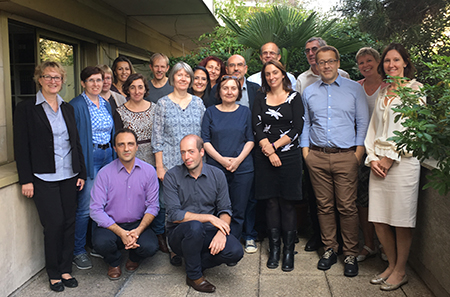
Horizontal Expert Working Group for the RNQP Project
(2 meetings of a core-group and 1 meeting of an enlarged-group)
Paris, 2016-06-7/10, 2016-07-11/13 and 2016-09-22/23
In the context of Regulation 2016/2031 of 26 October 2016 on protective measures against pests of plants, and its list of pests to be published in an implementing act in the following 3 years, EPPO has contracted a 2-year project with the EU Commission on Regulated Non-Quarantine Pests (RNQPs).
RNQPs are defined in two International Standards for Phytosanitary Measures (ISPM 16: Regulated non-quarantine pests: concept and application and ISPM 21: Pest risk analysis for regulated non-quarantine pests). More specifically article 36 of EU Regulation 2016/2031 defines RNQPs as pests with a clear taxonomic identity, present in the European Union territory, transmitted mainly through specific plants for planting, whose presence has an unacceptable economic impact as regards the intended use, and where feasible and effective measures are available. Article 37 of EU Regulation 2016/2031 regulates RNQPs for professional operators.
The pests/entries that may fulfill that definition, and for which the specification requires the assessment of the relevance of the RNQP status, are those currently listed within the EU Marketing Directives on reproductive material, plus some proposed by the Annex Working Group (section 2) of the EU Commission and mainly coming from Annex IIA2 of EU Council Directive 2000/29/EC.

Objective of the project
The objective of this project is to define a list of RNQPs for the EU. In addition, this list may serve as a basis for other EPPO member countries to establish their own regulations. In order to define such a list of RNQPs, the work has been divided into two phases:
- Phase 1: to define a screening methodology
- Phase 2: to apply the methodology to specific pests
Current achievement: development of the screening methodology
In 2016, a screening methodology was developed. Its development involved the following activities: 1) development of a database; 2) organization of two questionnaires to gather information on the economic value of the sectors; 3) discussions on how to address entries not precisely defined in the EU Marketing Directives (e.g. entries corresponding to pests not listed at species level); and 4) elaboration of proposals to amend the current thresholds/requirements implemented within those Directives.
A Horizontal Expert Working Group (HEWG) composed of experts coming from EU and non-EU countries was in charge of the drafting and finalization of the screening methodology. The HEWG was composed of a core group and an enlarged group:
- The core-HEWG was limited to 7 experts and was responsible for preparing the draft-methodology. A method proposal prepared by the EPPO Secretariat served as a basis for discussion within the HEWG.
The core group first met in Paris in the EPPO headquarters on 2016-06-7/10 to prepare a first draft for the methodology. The draft was circulated by email for comments to the enlarged-HEWG.
A second meeting of the core group was organized in Paris in the EPPO headquarters on 2016-07-11/13 to review the comments made during the consultation and to test the methodology on a list of pests (mainly from Annex IIA2 of Council Directive 2000/29/CE: candidates for RNQP status).
- Following the core-HEWG and in order to ensure a wider geographical coverage and a more extensive review, EPPO organized a face to face meeting of an enlarged-HEWG (core group experts plus other experts). The enlarged group met in Paris in the EPPO headquarters on 2016-09-22/23 and agreed upon and finalized the methodology.
